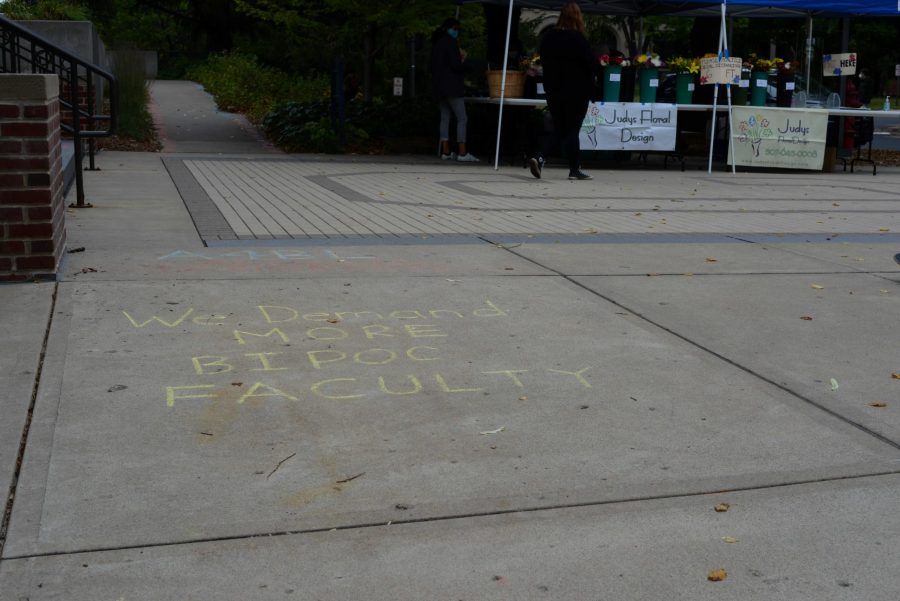A number of Carleton faculty participated in the Scholar Strike for Racial Justice on September 8th and 9th, during move-in days at Carleton. Faculty seized the opportunity to educate themselves and others on topics of racial injustice and to discuss ongoing action to improve racial equity on campus.
Two professors, Anthea Butler at the University of Pennsylvania and Kevin Gannon at Grand View University, started a #ScholarStrike hashtag on Twitter in late August, which gained attention across the country and turned into what Inside HigherEd said “could be the biggest collective action by academics in recent memory.”
The #ScholarStrike was organized as a collective stand by academics in opposition to ongoing police violence against Black communities and communities of color. The strike also called attention to other forms of state violence, such as “disparities in access to healthcare and health outcomes, most visible these days in the disproportionate effects of the COVID-19 pandemic on Black and Indigneous communities, immigrant communities, and other marginalized communities; and the longstanding educational debt owed to Black children and communities,” Anita Chikkatur, an associated professor of Educational Studies at Carleton, stated in her outgoing message while refraining from Carleton duties during the strike.



One week prior, a group of Carleton professors met to discuss the strike as a way for faculty to not only show solidarity with other striking groups, such as the WNBA), but as a way to highlight demands for change at Carleton. Amy Czismar Dalal, a Professor of Computer Science who organized the faculty meeting, said the strike was “a way to amplify the demands of black students at Carleton, a lot of which get at the structures not just at Carleton but at other institutions of higher education that are, at their heart, rooted in white supremacy.”
Faculty at the meeting identified three categories of action related to advising, teaching, and the visibility of the strike. Because advising days fell during the strike, some faculty called attention to the protest by delaying advising meetings while others used them as an opportunity to talk about racial justice. “How do we want to get first-year students thinking critically about race and racism in society and at Carleton right off the bat?” said Czismar Dalal.
Faculty also discussed curriculum material and teaching strategies. For instance, Kristin Bloomer, an associate professor of Religion, said that faculty in the Religion department met to discuss ways the department might “continue conversations about how the discipline is informed by and formed by structures of white supremacy.” One outcome of recent conversations was a new student and faculty book group about James Baldwin’s book The Fire Next Time.
“One of the things that I really appreciated hearing was that anti-racist discussions were something departments are taking the long view on and are approaching as an ongoing series of actions and discussions,” said Czismar Dalal.
Professors also reflected on how they interact with students. For instance, “How does racialized trauma affect our students’ experiences in the classroom, and how are we taking that into account as professors? How are we understanding the pain that students are going through from the more spectacular ways in which state violence happens, but also the everyday violence that happens?” Chikkatur said.
One challenge to the strike’s impact and visibility at Carleton was the fact that it took place before classes were in session. Some faculty spread #ScholarStrike messages on social media. “We also wanted to somehow make physically visible on campus the fact that faculty were involved in a strike,” said Bloomer. This led to chalking of #ScholarStrike messages, welcome statements to BIPOC students and quotations from civil rights activists across campus.
“Many faculty are working hard to address issues about racism and inequity on campus, and some of this work is hidden from students,” said Bloomer, as she emphasized that the strike took place as part of longer-term actions.
A series of faculty meetings and actions over the summer preceded the strike. The weekend following George Floyd’s murder in Minneapolis, Bloomer helped coordinate a protest in Northfield that drew around 150 people (including faculty and students), and a small number of faculty met to process what had happened. Subsequently, about 80 Carleton faculty and staff met every couple weeks over the summer to talk about anti-racism and the events of recent months and years.
After several large-group meetings, faculty broke into five subgroups dealing with separate discrete issues ranging from discussing curriculum and student support to meeting with alumni and BIPOC students. These discussions stimulated both awareness and action. For instance, a group of faculty are now seeking grants from the National Endowment for the Humanities to support a two-year intensive project about anti-racism issues on campus.
Mostly, faculty highlighted their desire to amplify the demands already being made by both Black students and organizations and the over 2,000 alumni who signed a letter this summer, including (but not limited to) demands for a Black cultural center, more support for Africana Studies, more Black and BIPOC faculty, and larger strategic thinking about how Carleton is going to improve racial equity.










